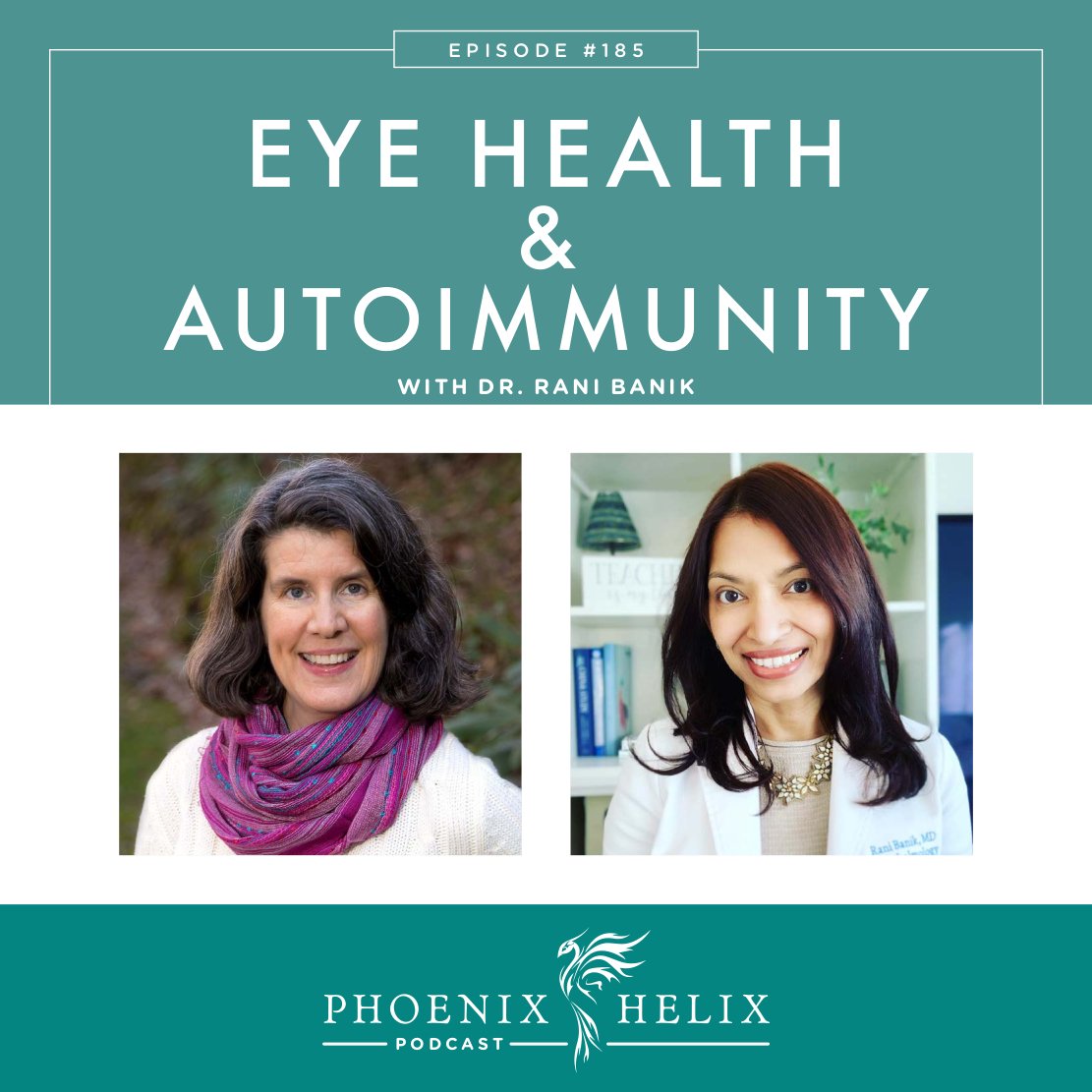Why Do So Many Autoimmune Diseases Impact the Eyes?
I have two friends who were diagnosed through a referral from their ophthalmologist. Their first autoimmune symptoms appeared in their eyes. Across diagnoses, this is quite common. Eye pain, dryness, swelling, inflammation, vision loss, and double vision – almost every autoimmune diagnosis can include eye symptoms. This is why an ophthalmologist is an important person to have on our healthcare team. Today, we’re lucky enough to have an integrative ophthalmologist on the podcast. Dr. Rani Banik is a board-certified neuro-ophthalmologist with over 20 years of medical experience as a clinician, educator, and researcher. She also has specialized training in functional medicine and treats her patients from a holistic perspective.
Listen to the Show
- Subscribe to my podcast through your favorite podcast app: iTunes, Stitcher, Google, TuneIn, Spotify, Amazon, etc.
- You can also listen to the episode right here through the player below, and if you subscribe to my newsletter you’ll get notified of future episodes.
Podcast: Play in new window | Download
Show Notes
- Intro (0:00)
- Thank You To Our Podcast Sponsor – Sip Herbals Coffee Substitutes (2:42)
- Are you missing coffee on the Paleo Autoimmune Protocol? Not any more! Sip Herbals has created a complete line of delicious drinks for you. Their original herbal coffee is made from just three organic, caffeine-free ingredients: roasted chicory powder, roasted carob powder, and roasted dandelion root powder. It creates a rich, flavorful blend.
- Now, they’ve expanded their line to include five delicious flavors: Pumpkin Spice, Salted Caramel, Dirty Chai, Mocha, and Peppermint Mocha. You won’t find any artificial ingredients in these mixes. Instead, they’re flavored with real herbs and spices, and they’re all AIP-friendly.
- The other thing I love about Sip Herbals is that it’s a small business started by two women in our community who loved coffee, but learned that coffee didn’t love them back. So, they created a delicious substitute and started Sip Herbals to share it with others.
- To learn more, visit SipHerbals.com and use the code PHOENIX for 10% off your first order.
- Meet Dr. Rani (4:17)
- Dr. Rani Banik is a board-certified neuro-ophthalmologist with over 20 years of medical experience as a clinician, educator, and researcher. She also has specialized training in functional medicine and treats her patients holistically.
- Her interest in integrative medicine came from own health challenges, specifically chronic migraines. She tried the conventional pharmaceutical approach and it wasn’t effective for her. So, she dove into the research and discovered multiple ways to treat migraines through diet, lifestyle, and supplements. That changed her approach to her own health and inspired a change in her career as well. She sought training in functional medicine and is now an integrative ophthalmologist, offering a blend of conventional and functional approaches.
- Why Do So Many Autoimmune Diseases Affect the Eyes? (8:08)
- Our eyes are intimately connected to many other organ systems in the body, including the neurologic, cardiovascular, and immune systems. When the immune system gets activated in autoimmune disease, antibodies can be created against certain tissues in the body. Those antibodies sometimes cross-react with tissues within the eyes and cause inflammation there as well. In addition, the eyes are a direct extension of the brain, and both the brain and eyes are vulnerable to inflammation within the body.
- Potential Eye Symptoms with Autoimmune Disease (9:36)
- The optic nerve connects the eye to the brain, and neurological autoimmune conditions like MS, NMO, and MOG can impact this nerve and cause vision loss.
- Myasthenia gravis is an autoimmune disease that attacks the neuromuscular junction. This can cause weakness in the eye muscles leading to double vision and droopy eyelids.
- Thyroid eye disease can occur with Graves’ disease or Hashimoto’s. This is when thyroid antibodies cross-react with tissues within the eye socket, causing inflammation and bulging eyes.
- Sjogren’s disease attacks the tear glands, causing severe dry eyes, but many other autoimmune conditions can cause dry eyes as well.
- Uveitis is inflammation inside the eye that can occur with many systemic autoimmune conditions, including rheumatoid arthritis, ankylosing spondylitis, psoriatic arthritis, lupus, and inflammatory bowel disease.
- Autoimmune skin conditions can affect the eyelids, which in turn can cause dry eyes, inflammation, or other eye issues. The same is true for non-autoimmune skin conditions like rosacea and eczema.
- There’s a close connection between the eyes and the cardiovascular system, so any autoimmune disease that causes inflammation in blood vessels can also impact the eyes.
- Diabetes can cause blurry vision and also increases the risk of developing cataracts and glaucoma.
- When alopecia causes loss of eyelashes, that can lead to eye problems as well.
- Virtually any autoimmune condition has the potential to impact the eyes.
- Resource: Ocular Manifestations of Autoimmune Disease.
- Medication Side Effects and the Eyes (14:52)
- Steroids are the most common medication with eye side effects. It doesn’t happen to everyone, but anyone who takes steroids long-term should be closely monitored. Steroids can induce glaucoma (high pressure in the eyes) and cataracts (clouding of the lens of the eye). They can also make someone more vulnerable to eye infections (herpes and fungal infections).
- Plaquenil is a medication commonly prescribed for lupus. It can cause toxicity of the retina, but it’s a side effect that’s time and dose-dependent. It’s rarely seen before 7 years of use.
- Biologic medication (TNFa inhibitors) can cause optic neuritis (inflammation of the optic nerve).
- Our goal here is to educate, not scare people away from medication that’s needed to manage their condition. These are potential side effects that may never arise for you. However, if you’re taking these medications, see an ophthalmologist regularly to monitor your eye health.
- Integrative Treatment for Eye Health Problems (17:24)
- Integrative medicine is a holistic approach that combines conventional and functional medicine.
- Conventional medicine is sometimes necessary to address acute inflammation in the eye, because acute inflammation can lead to scarring, glaucoma, or cataracts.
- However, Dr. Rani believes in a root cause approach. She’s most interested in discovering what’s triggering the inflammation in the first place. Her protocol includes therapeutic diets, personalized supplementation, lifestyle strategies, and stress management.
- Can Eye Problems Be Reversed? (21:05)
- Most eye problems can be reversed if caught early. So, if you’re experiencing eye symptoms, see an ophthalmologist right away. The sooner they’re treated, the less likely they are to become permanent. We all have a tendency to denial sometimes, hoping problems will go away on their own. When it comes to your eyes, overcome that impulse and seek help immediately.
- Dr. Rani has found that dry eyes are one of the easiest conditions to treat with an integrative approach. Eye drops can help immediately, but long-term, omega-3 fatty acids and GLA (a specific type of omega-6 fatty acid) are important for ocular surface health.
- Omega Oils and Eye Health (25:03)
- Omega-3 essential fatty acids (DHA and EPA) are known for their anti-inflammatory properties, and omega-6 essential fatty acids usually have a pro-inflammatory effect. Most people’s diet includes more omega-6 than omega-3. Increasing the omega 3’s in our diet offers anti-inflammatory benefits. Seafood (or supplemental fish oil) is the richest source of omega 3’s.
- However, there is one omega-6 essential fatty acid that is beneficial to eye health, and that’s GLA. It’s found in borage oil, evening primrose oil, and black currant oil. The eyelids need a combination of DHA, EPA, and GLA to produce the proper oils to lubricate the surface of the eye.
- The retina also holds the highest concentration of DHA in our bodies. The cell membranes of the retinal photo receptors are made out of DHA, and they turnover quickly. They need a steady supply of DHA to be able to replenish and stay healthy.
- Resources:
- Elimination Diets for Eye Health (28:06)
- Dr. Rani does recommend an elimination diet to identify food intolerances for anyone with eye inflammation or autoimmune eye disease.
- At a minimum, she recommends removing dairy, gluten, and nightshades. Those are the top three food triggers she sees in her practice.
- Elimination diets are often recommended for 3 weeks, because that’s the life span of an IgG antibody against a particular food. The Paleo Autoimmune Protocol recommends a one month minimum for this reason. But B cells are the immune cells that release these antibodies, and their life span is 3 months. So, she recommends people continue the elimination diet for 3 months for a true clean slate before reintroducing foods.
- Thank You to Our Podcast Sponsor – ShopAIP (32:05)
- It’s officially fall in the northern hemisphere, and that gets many people craving apples and pumpkin spice. ShopAIP is your resource for AIP baking, with a wide selection of AIP flours and natural sweeteners. You can find 50 delicious recipes in my Pumpkin Recipe Roundup. But ShopAIP also has two ready-to-go treats you might enjoy: Bare Fruit Crunchy Apple Chips and Jack’s Paleo Kitchen Pumpkin Spice cookies. Celebrate the season!
- ShopAIP is an online store dedicated to the Paleo Autoimmune Protocol. With hundreds of items for the elimination phase of the AIP, and new products labeled by reintroduction category as well. You can find protein bars, sauces and condiments, AIP-friendly spices, cooking and baking ingredients, waffle and pancake mix, delicious snacks, and more.
- If you’re a first-time customer, use the code PHOENIX for 10% off your order. Purchase here.
- Nutrients for Eye Health (33:30)
- The three macular carotenoids are lutein, zeaxanthin, and meso-zeaxanthin. These are essential nutrients, meaning that our body can’t make them on its own, so we need to get them through diet or supplementation. We need approximately 6.5 mg lutein and 1-2 mg zeaxanthin daily. Meso-zeaxanthin is then converted from lutein within the body. These nutrients get deposited into the the macula at the back of our eyes, and the macula gives us our central vision. These carotenoids serve as an antioxidant shield and also absorb harmful rays of light to prevent eye damage. They act as internal sunglasses and blue light blockers.
- The best food sources are leafy greens, egg yolks, orange and yellow fruits and vegetables, and herbs and spices. Saffron has even been studied in the treatment and prevention of macular degeneration.
- However, it’s difficult to get enough of these nutrients through diet alone. For that reason, Dr. Rani does recommend an eye health supplement in addition to adding more of these foods to your diet.
- Resources:
- Choosing an Eye Health Supplement (39:42)
- Option 1: Macular carotenoids only (lutein, zeaxanthin, and meso-zeaxanthin)
- Option 2: Macular carotenoids combined with other antioxidants (astaxanthin, glutathione, alpha lipoic acid, N-acetyl cysteine)
- Option 3: An eye health multivitamin that combines the carotenoids with a wide variety of vitamins and minerals that support general body health
- Dr. Rani’s favorite brand: Healthy Directions Vision Essentials Ultra: It includes the macular carotenoids along with bilberry extract, saffron extract, glutathione, and a few other antioxidants. (It’s also gluten-free, dairy-free, soy-free, and contains no artificial preservatives. Here’s the full ingredient list.)
- Botanicals (42:10)
- Dr. Rani does prescribe these in her practice on an individual, personalized basis. She doesn’t use them for general eye health.
- One example is chios mastic gum for optic nerve regeneration for patients who have suffered an optic nerve stroke. Dr. Rani participated as an investigator for a clinical trial that showed great promise for this treatment, but unfortunately due to funding, the study wasn’t completed. However, anecdotally in her practice, she has seen patients’ vision improve. Mastic gum has been used for thousands of years to help with gastrointestinal issues. Research into the benefits for eye health is new.
- Essential Oils (45:31)
- Dr. Rani’s interest in essential oils was inspired by her own health journey, as she found that certain oils helped her migraines.
- One of her favorite essential oils for eye health is tea tree oil (melaleuca). The human microbiome exists in many places in the body, including the surface of the eye. Beneficial microbes help preserve eye health. Tea tree oil in an eyelid scrub helps restore a healthy ocular microbiome. Note: Buy products specifically formulated for the eye that are diluted and pH balanced. Applying tea tree oil directly would irritate and could inflame the eye.
- Stress Management (47:38)
- This is a cornerstone of Dr. Rani’s integrative approach, since stress is strongly linked to inflammation and autoimmune disease.
- She recommends her patients try guided meditations through one of the meditation apps. Start with just two minutes, and as you gain comfort you can increase your time. She recommends doing this at least once a day, but twice a day is even better. You don’t need to sit still when you meditate. You do walking meditations, or even food meditations. One of Dr. Rani’s favorites is the raisin meditation.
- She also recommends people find a hobby they love and make time for it in their lives. Joy is a wonderful stress reliever.
- Resource podcasts:
- How Often Should We See an Eye Doctor? (51:21)
- If you’ve been diagnosed with autoimmune disease, see an ophthalmologist (not an optometrist) for a baseline examination. Ophthalmologists have more training in eye disease. Get a full dilated exam, and from that exam, the ophthalmologist will determine if further tests are necessary.
- After that, appointment frequency will vary from patient to patient. People with active eye issues will need more frequent appointments. For routine monitoring, once or twice a year is standard, with the caveat that you make an appointment immediately if you experience eye issues.
- Dr. Rani’s Book (53:10)
- It’s called The Macular Degeneration Solution and is due to be published at the end of 2021. Macular degeneration is a leading cause of blindness worldwide, and 11 million people in the US alone have this condition. The good news is that it’s preventable. Her book offers seven integrative strategies that incorporate nutrition and lifestyle.
- Outro (54:12)
- Dr. Rani Banik has a private practice in New York City, and she is accepting new patients. You can connect with her through her website. She’s also active on Instagram and hosts two Facebook groups: EnVision Health and Eye on Migraine.
- Eileen (your podcast host) is the author of multiple books, written to help people thrive with autoimmune disease. Learn more on the Books Page.
- If you like this podcast, follow or subscribe through your favorite podcast app. You can also subscribe to Eileen’s biweekly newsletter.
- Check out the entire archive of podcast episodes.
You May Also Be Interested In
Spreading the Word
If you like the podcast, please leave a positive review in iTunes. It would mean the world to me, and also helps others find the podcast. Here are some quick instructions using your iPhone:
- If you are already subscribed to my podcast: (1) Click the purple podcast icon. (2) At the bottom of the screen, click Library. (3) At the top of the screen, click Shows. (4) Click the Phoenix Helix podcast image. (5) Scroll down the page, and you’ll see Ratings and Reviews. Scroll down a little bit more and click on Write a Review. This will bring up the review screen. Tap 5 stars (if you love the podcast), and then click in the title box, and it will bring up the keyboard. Enter a title and short review. (6) Click Send in the upper right corner. (7) Thank you! Positive reviews give the podcast a higher search ranking in iTunes, helping people find it and letting them know it’s a quality podcast and worth their time to listen.
- If you haven’t subscribed to my podcast: (1) Click the purple podcast icon. (2) In the lower right corner, click the magnifying class. (3) Type Phoenix Helix in the search box. (4) Click the podcast cover in the Show list. (5) If you’d like to subscribe, click the + sign at the top of the screen. (6) To write a review, scroll down the page, and you’ll see Ratings and Reviews. Scroll down a little bit more and click on Write a Review. This will bring up the review screen. Tap 5 stars (if you love the podcast), and then click in the title box, and it will bring up the keyboard. Enter a title and short review. (7) Click Send in the upper right corner. (8) Thank you! Positive reviews give the podcast a higher search ranking in iTunes, helping people find it and letting them know it’s a quality podcast and worth their time to listen.








